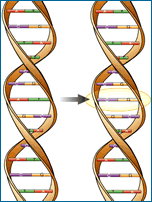Study
Suggests Genetic Factors May Help Explain High Rates of Hepatitis B among Asians
By
Liz Highleyman Hepatitis
B virus (HBV) is endemic throughout much of Asia; in other parts of the world,
rates are much higher among people of Asian/Pacific Islander descent. Asians are
more likely to be infected with HBV at birth, and people who contract the virus
at a young age are less likely to experience spontaneous clearance. This heightened
vulnerability may be attributable to genetic factors, according to a study published
in the May 2009 issue of Nature Genetics.
Yoichiro Kamatani and
colleagues from Japan and Thailand performed a 2-stage, genome-wide association
study that included 786 Japanese chronic hepatitis B patients and 2201 control
subjects without hepatitis B.
 The
investigators identified a significant association between chronic HBV infection
and the presence of 11 single nucleotide polymorphisms (SNPs), or specific genetic
variations, in a region including human leukocyte antigens HLA-DPA1 and HLA-DPB1.
The HLA system, or major histocompatibility complex, refers to a set of genes
that regulate immune function. The
investigators identified a significant association between chronic HBV infection
and the presence of 11 single nucleotide polymorphisms (SNPs), or specific genetic
variations, in a region including human leukocyte antigens HLA-DPA1 and HLA-DPB1.
The HLA system, or major histocompatibility complex, refers to a set of genes
that regulate immune function.
The researchers were then able to validate
these associations by genotyping 2 SNPs from the region in 3 additional Japanese
and Thai cohorts consisting of 1300 people with chronic hepatitis B and 2100 uninfected
control subjects.
Subsequent analyses revealed 2 haplotypes associated
with increased risk of chronic hepatitis B:
 HLA-DPA1(*)0202-DPB1(*)0501 -- odds ratio (OR) 1.45;
HLA-DPA1(*)0202-DPB1(*)0501 -- odds ratio (OR) 1.45;
 HLA-DPA1(*)0202-DPB1(*)0301 -- OR 2.31.
HLA-DPA1(*)0202-DPB1(*)0301 -- OR 2.31.
They
also identified 2 apparently protective haplotypes:
 HLA-DPA1(*)0103-DPB1(*)0402 -- OR 0.52;
HLA-DPA1(*)0103-DPB1(*)0402 -- OR 0.52;
 HLA-DPA1(*)0103-DPB1(*)0401 -- OR 0.57.
HLA-DPA1(*)0103-DPB1(*)0401 -- OR 0.57.
In
conclusion, the study authors wrote, "Our findings show that genetic variants
in the HLA-DP locus are strongly associated with risk of persistent infection
with hepatitis B virus."
Laboratory of Molecular Medicine, Human
Genome Center, Institute of Medical Science and Department of Medical Genome Sciences,
Graduate School of Frontier Sciences, University of Tokyo, Tokyo, Japan; Medical
Genetic Section, National Institute of Health, Department of Medical Sciences,
Ministry of Public Health, Nonthaburi, Thailand; Center for Genomic Medicine,
RIKEN, Kanagawa, Japan; Department of Medicine and Molecular Science, Division
of Frontier Medical Science, Programs for Biomedical Research, Graduate School
of Biomedical Sciences, Hiroshima University, Hiroshima, Japan; Department of
Hepatology, Toranomon Hospital, Tokyo, Japan; Department of Medicine and Virology
and Molecular Microbiology Unit, Department of Pathology, Ramathidi Hospital,
Mahidol University, Bangkok, Thailand. 5/22/09
Reference
Y
Kamatani, S Wattanapokayakit, H Ochi, and others. A genome-wide association study
identifies variants in the HLA-DP locus associated with chronic hepatitis B in
Asians. Nature Genetics 41(5): 591-595. May 2009. (Abstract).
|